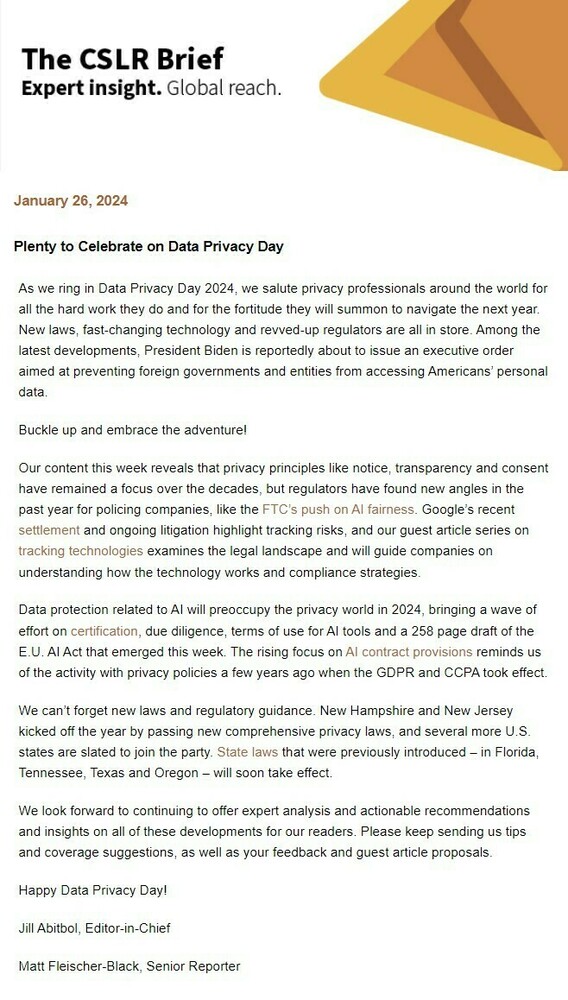Apr. 23, 2025
Apr. 23, 2025
Sale of 23andMe’s Genetic Data: Lessons for Companies Around Sensitive Data
Twenty-five states alleged last week that 23andMe’s privacy policies violated multiple states’ laws and that customers’ data is not secure, urging a bankruptcy court to appoint independent experts to recommend privacy and security measures before the company may sell genetic data as an asset. Alaska separately told the court that its state law requires 23andMe to seek new customer consent for the sale. This article, the second installment in a two-part series with insights from Withers and LK Law Firm, distills the legal questions about privacy that have emerged in the bankruptcy case and offers lessons from the proceedings for other companies, including takeaways about emerging risks and laws around sensitive data inferences. Part one discussed the growing potential for state privacy laws to play a disruptive role in bankruptcies and possible powers for an appointed privacy ombudsman in the 23andMe case. See “FTC and State Enforcers Reveal What’s Next and What to Do About It” (Oct. 2, 2024). Read full article …
Redefining Compliance From a Consumer-Centric Obligation to Product-Embedded Enablement
Compliance, once a function that followed innovation, must now move ahead of it. The paradigm is shifting as organizations transition from responding to regulatory demands to embedding compliance directly within product design, development and delivery. In this guest article, Nikhil Sarnot, a managing director at Accenture Security, discusses how compliance must evolve from an oversight function into a foundational enabler and offers practical steps for shaping the way compliance teams achieve that goal. See “The Algorithmic CCO: Practical Steps for Implementing AI in Compliance” (Mar. 12, 2025). Read full article …
How Ericsson Made Compliance Training Must-See TV
Most compliance training is thought of as dry and boring, but if packaged as a dramatic TV show, it can excite and engage employees, according to compliance experts at a company that has seen and resolved its fair share of compliance issues. Kelly Sargeant, Ericsson’s global head of compliance training and communications, and Vidya Krishnan, its global chief learning officer, explained during a recent conference how their narrative approach to training integrates lessons from different fields without a prohibitive price tag. This article distills their insights, including how, once a program is up and running, a combination of AI and staff contributions can make it ever more efficient. See “Rethinking Click-Through Training: Maximize Effectiveness With Customization” (Apr. 16, 2025). Read full article …
Mayer Brown Welcomes Back Data Privacy Partner in Chicago
Lei Shen has rejoined Mayer Brown as a partner in its cybersecurity & data privacy practice in Chicago. She arrives from Cooley. For commentary from Shen, see “What to Expect From the CPRA – California’s New Proposed Privacy Law” (Sep. 30, 2020). For insights from Mayer Brown, see “How the 2025 Cybersecurity Executive Order Affects Business” (Feb. 5, 2025); and “Nine Cybersecurity Resolutions for 2025” (Jan. 22, 2025). Read full article …
Seasoned Technology and AI Partner Joins Dentons’ Privacy and Cybersecurity Team in Maine
Dentons has welcomed Andrew Clearwater to the firm’s privacy and cybersecurity team as a partner in Portland, Maine. He arrives from security software provider OneTrust. For commentary from Clearwater, see “Implications of the New E.U. AML Directive” (Jul. 10, 2024); and “U.K. Equifax Fine Calls for Stricter Parent-Subsidiary Data-Sharing Processes” (Oct. 25, 2023). Read full article …
Most-Read Articles
-
Mar. 26, 2025
Navigating Global Privacy Control’s Not-So-Simple Implementation -
Apr. 16, 2025
Sale of 23andMe’s Genetic Data: Implications of the Motions for a Privacy Ombudsman and State Laws -
Apr. 9, 2025
Six Steps to Address the SEC’s Trump Era Cyber Enforcement Priorities -
Apr. 16, 2025
Checklist for AI Procurement -
Mar. 26, 2025
Implications of the Trump AI Executive Order
Women to Watch: Contributions, Achievements and Observations of Outstanding Female Professionals

To mark International Women’s Day, women editors and reporters at ION Analytics interviewed outstanding women in the industries and jurisdictions we cover. In this part, Law Report Group editors Jill Abitbol, Robin L. Barton and Megan Zwiebel profile notable women in data privacy, cybersecurity, private funds and anti-corruption law, including Anne-Gabrielle Haie, Jessica Lee, Micaela McMurrough, Laura Perkins, Amanda Raad, Madelyn Calabrese, Ranah Esmaili and Genna Garver. Enjoy reading their inspiring remarks here.
Spotlight on Trailblazing Women
To mark International Women’s Day 2024, women editors and reporters of ION Analytics interviewed outstanding women in the industries and jurisdictions we cover. In this part, Jill Abitbol, Managing Editor of the Cybersecurity Law Report and Anti-Corruption Report, features notable women in data privacy, cybersecurity, white collar defense, compliance and anti-corruption law, including Christina Montgomery, Leslie Shanklin, Palmina Fava, Alexandra Ross and Lucinda Low. Enjoy reading their inspiring remarks here.
Spotlight on Trailblazing Women
In honor of International Women’s Day, some of ION Analytics' editorial teams led by women interviewed notable women in the markets and industries we cover. In this part, the Cybersecurity Law Report highlighted notable women in compliance and hedge fund, data privacy and cybersecurity, and anti-corruption law, including Amii Barnard-Bahn, Abigail Bell, Genna Garver, Jane Horvath, Barbara Li, Amy Mushahwar, Mara Senn and Carol Widger. The interviews are here.
Webinar on Compliant International Data Transfers


Listen here to our discussion with our colleagues at Ethos Privacy, which took place on March 1, 2022, on how to approach international data transfer challenges.
Webinar on Getting a Handle on Vendor Contracts

A recording of the March 10 webinar can be accessed here.
Cybersecurity Resolutions for 2021
In this quick take video, we talk about some of our cybersecurity resolutions for 2021.
Facial Recognition Concerns
In this short video, we discuss the privacy and bias concerns with facial recognition technology.
ACR and CSLR Spring Update 2020
The Senior Editors of the Anti-Corruption Report and the Cybersecurity Law Report recently teamed up to present an update on the trends and hot topics in the anti-corruption, cybersecurity and data privacy spaces since the beginning of the year and what the publications will be focusing on in the coming months. A complimentary download of the webinar is available here.
Upcoming Webinar: Companywide Work From Home - Cybersecurity and Privacy Best Practices
Please join us on Monday, March 23, 2020, from 12:00 p.m.- 12:30 p.m. EDT for a complimentary webinar discussing the cybersecurity and privacy challenges the shift to remote working has created and how to overcome them. Registration information for the webinar is here.
Upcoming Webinar to Explore Best Practices for Alternative Data Use

Please join us on Wednesday, January 15, 2020, at 11:00 a.m. EST for a complimentary webinar hosted by our sister publication, the Hedge Fund Law Report, discussing issues relating to the use of alternative data by private fund managers. To register for the webinar, click here.
Upcoming HFLR/CSLR Webinar to Explore Strategies and Tactics for Conducting an Effective Tabletop Exercise
Please join the Hedge Fund Law Report and the Cybersecurity Law Report on Tuesday, July 30, 2019, at 1:00 p.m. ET for a complimentary webinar discussing the strategies and tactics companies can employ to conduct an effective tabletop exercise. GCs and CCOs are encouraged to invite their CISOs and CTOs to join as well. The webinar will be moderated by Shaw Horton, Associate Editor of the Hedge Fund Law Report, and will feature Luke Dembosky, partner at Debevoise, John “Four” Flynn, chief information security officer at Uber, and Jill Abitbol, Senior Editor of the Cybersecurity Law Report. Registration for the webinar is available here.
Anti-Corruption Webinar: How HPE Is Using Its New T&E Tool to Generate Compliance Metrics
Measuring the effectiveness of a compliance program can be tricky, but some companies are finding ways to use their existing internal controls to generate useful data. Join our sister publication the Anti-Corruption Report (ACR) for a complimentary webinar that explores Hewlett Packard Enterprises’ new travel-and-entertainment-approval tool. On Wednesday, March 27, 2019, from 1:00 p.m. to 2:00 p.m. EDT, the ACR’s Megan Zwiebel will interview Becky Rohr, vice-president of anti-corruption and global trade at Hewlett Packard Enterprises, about how they are using their T&E tool to measure and improve compliance. Registration information is here.








